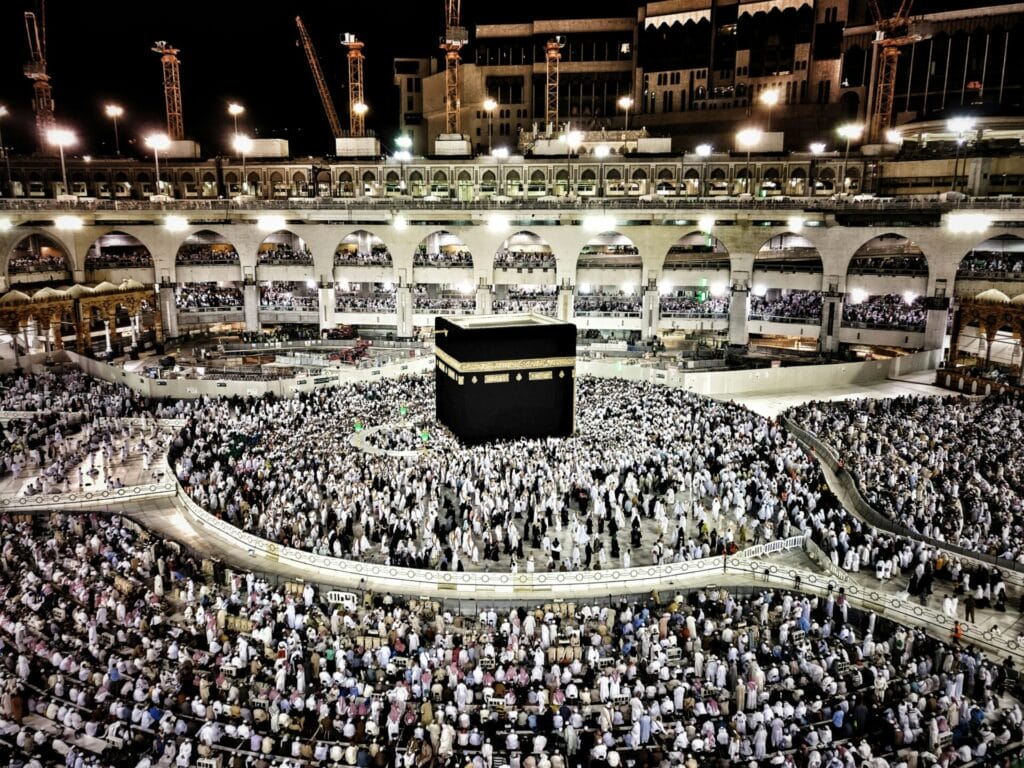The Hajj pilgrimage is a spiritual journey that holds immense significance for Muslims around the world. It is considered one of the five pillars of Islam and is a mandatory religious duty for all able-bodied Muslims who can afford to undertake the journey. The pilgrimage takes place in the holy city of Mecca, Saudi Arabia, and is a time for Muslims to come together in unity and devotion to Allah. The spiritual journey of Hajj begins with the intention to perform the pilgrimage and continues with a series of rituals and traditions that symbolize the faith and commitment of the pilgrims. The journey is a time for reflection, prayer, and seeking forgiveness, as well as an opportunity to strengthen one’s faith and connection to Allah.
The spiritual journey of Hajj is a deeply personal and transformative experience for many pilgrims. It is a time for self-reflection, repentance, and seeking forgiveness for past sins. The pilgrimage is also a time for Muslims to reaffirm their faith and devotion to Allah, as well as to seek spiritual purification and renewal. The journey is a test of patience, endurance, and faith, as pilgrims endure physical hardships and challenges along the way. The spiritual significance of Hajj lies in the belief that it is a time for Muslims to come closer to Allah and seek His mercy and blessings. It is a time for spiritual growth, self-improvement, and seeking guidance from Allah.
The Global Diversity of Hajj Pilgrims
The Hajj pilgrimage attracts millions of Muslims from around the world, making it a truly global and diverse gathering of people. Pilgrims come from all corners of the globe, representing a wide range of cultures, languages, and ethnicities. The diversity of Hajj pilgrims is a testament to the universal appeal and significance of the pilgrimage in Islam. It is a time for Muslims to come together in unity and solidarity, regardless of their background or nationality. The global diversity of Hajj pilgrims is a reflection of the inclusive nature of Islam, which welcomes people from all walks of life to participate in the pilgrimage.
The global diversity of Hajj pilgrims is a source of strength and richness for the Muslim community. It is a time for Muslims to connect with one another, learn from each other, and celebrate their shared faith and devotion to Allah. The pilgrimage provides an opportunity for pilgrims to break down barriers and build bridges across cultures and nationalities. It is a time for Muslims to come together as one community, united in their love for Allah and their commitment to Islam. The global diversity of Hajj pilgrims also serves as a reminder of the universal message of Islam, which transcends geographical boundaries and cultural differences.
The Rituals and Traditions of Hajj
The Hajj pilgrimage is marked by a series of rituals and traditions that have been passed down through generations of Muslims. These rituals are deeply rooted in the history and teachings of Islam and hold great significance for the pilgrims who undertake them. The rituals of Hajj include the Tawaf, which is the act of circling the Kaaba seven times in a counterclockwise direction, as well as the Sa’i, which involves walking seven times between the hills of Safa and Marwah. Other rituals include the symbolic stoning of the devil at Mina, the sacrifice of an animal in commemoration of Prophet Ibrahim’s willingness to sacrifice his son Isma’il, and the shaving or trimming of the hair as a sign of purification.
The traditions of Hajj are a time-honored part of the pilgrimage experience and serve as a means for pilgrims to connect with their faith and history. The rituals are designed to symbolize key events in Islamic history and provide an opportunity for pilgrims to demonstrate their devotion and obedience to Allah. The traditions also serve as a reminder of the importance of sacrifice, humility, and submission to Allah’s will. The rituals and traditions of Hajj are a central part of the pilgrimage experience and hold great significance for Muslims around the world.
The Unity and Solidarity of Hajj Pilgrims
The Hajj pilgrimage is a time for Muslims to come together in unity and solidarity, regardless of their background or nationality. Pilgrims from all walks of life gather in Mecca to perform the rituals of Hajj, demonstrating their shared faith and devotion to Allah. The unity and solidarity of Hajj pilgrims is a powerful symbol of the inclusive nature of Islam, which welcomes people from all corners of the globe to participate in the pilgrimage. The pilgrimage provides an opportunity for Muslims to break down barriers and build bridges across cultures and nationalities.
The unity and solidarity of Hajj pilgrims is a source of strength and richness for the Muslim community. It is a time for Muslims to connect with one another, learn from each other, and celebrate their shared faith and devotion to Allah. The pilgrimage provides an opportunity for pilgrims to come together as one community, united in their love for Allah and their commitment to Islam. The unity and solidarity of Hajj pilgrims also serves as a reminder of the universal message of Islam, which transcends geographical boundaries and cultural differences.
The Cultural and Ethnic Diversity of Hajj Pilgrims
The Hajj pilgrimage attracts millions of Muslims from around the world, representing a wide range of cultures, languages, and ethnicities. Pilgrims come from diverse backgrounds, bringing with them their unique customs, traditions, and ways of life. The cultural and ethnic diversity of Hajj pilgrims is a testament to the universal appeal and significance of the pilgrimage in Islam. It is a time for Muslims to come together in unity and solidarity, regardless of their background or nationality. The cultural and ethnic diversity of Hajj pilgrims is a reflection of the inclusive nature of Islam, which welcomes people from all walks of life to participate in the pilgrimage.
The cultural and ethnic diversity of Hajj pilgrims is a source of strength and richness for the Muslim community. It is a time for Muslims to connect with one another, learn from each other, and celebrate their shared faith and devotion to Allah. The pilgrimage provides an opportunity for pilgrims to break down barriers and build bridges across cultures and nationalities. It is a time for Muslims to come together as one community, united in their love for Allah and their commitment to Islam. The cultural and ethnic diversity of Hajj pilgrims also serves as a reminder of the universal message of Islam, which transcends geographical boundaries and cultural differences.
The Symbolism and Significance of Hajj
The Hajj pilgrimage is rich in symbolism and holds great significance for Muslims around the world. The rituals and traditions associated with Hajj are deeply rooted in Islamic history and teachings, serving as reminders of key events in the faith’s history. For example, the Tawaf represents the unity of Muslims around the world in their worship of Allah, while the Sa’i symbolizes Hagar’s search for water in the desert after being left by Prophet Ibrahim. The stoning of the devil at Mina represents Prophet Ibrahim’s rejection of Satan’s temptations, while the sacrifice commemorates his willingness to sacrifice his son Isma’il at Allah’s command.
The symbolism and significance of Hajj extend beyond its rituals to encompass broader themes such as sacrifice, humility, obedience, and submission to Allah’s will. The pilgrimage serves as a reminder for Muslims to reflect on these values and incorporate them into their daily lives. It also serves as an opportunity for spiritual growth, self-improvement, and seeking guidance from Allah. The symbolism and significance of Hajj are central to its role as one of the five pillars of Islam, representing an essential aspect of Muslim faith and devotion.
The Impact of Hajj on the Lives of Pilgrims
The impact of Hajj on the lives of pilgrims is profound and far-reaching. For many Muslims, undertaking the pilgrimage is a once-in-a-lifetime opportunity that leaves a lasting impression on their faith, spirituality, and worldview. The experience of performing the rituals and traditions associated with Hajj can be transformative, leading many pilgrims to return home with a renewed sense of purpose, devotion, and commitment to Islam. The impact of Hajj on the lives of pilgrims extends beyond personal growth to encompass broader themes such as unity, solidarity, cultural exchange, and global citizenship.
The impact of Hajj on the lives of pilgrims also extends to their communities and societies at large. Many pilgrims return home with a newfound sense of compassion, empathy, and understanding for others, leading them to become more active participants in their communities. The pilgrimage serves as a catalyst for positive change in many pilgrims’ lives, inspiring them to become better individuals, family members, friends, neighbors, and citizens. The impact of Hajj on the lives of pilgrims is a testament to its enduring significance as one of the most important religious gatherings in Islam.
In conclusion, the Hajj pilgrimage holds immense spiritual significance for Muslims around the world. It is a time for self-reflection, prayer, seeking forgiveness, spiritual growth, self-improvement, seeking guidance from Allah, unity, solidarity, cultural exchange, global citizenship among others. The rituals are designed to symbolize key events in Islamic history providing an opportunity for pilgrims to demonstrate their devotion & obedience to Allah & serve as reminders about sacrifice & submission to Allah’s will among others.
The Hajj pilgrimage also fosters a sense of community and brotherhood among Muslims, as millions of people from different countries and backgrounds come together to fulfill this important religious duty. It is a time for Muslims to connect with their faith, strengthen their relationship with Allah, and seek blessings for themselves and their loved ones. The experience of Hajj is a profound and life-changing journey that leaves a lasting impact on the hearts and minds of those who undertake it, instilling a sense of humility, gratitude, and spiritual fulfillment. Overall, the Hajj pilgrimage is a deeply meaningful and transformative experience that holds great significance in the lives of Muslims worldwide.

